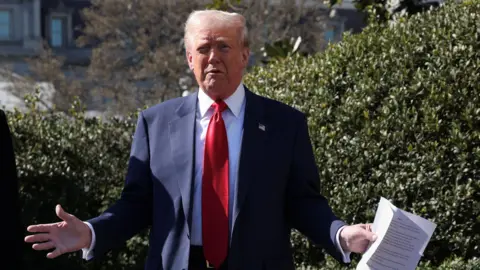Economics correspondent, BBC News
 Reuters
ReutersThe 25% tariff on steel and aluminium imports significantly impacts several of the US’s key trading partners
US President Donald Trump’s tariffs on steel and aluminium imports have come into play, likely increasing friction with many of America’s chief trading allies.
This policy implements a flat 25% tariff on steel and aluminium entering the US, nullifying previous country exemptions for these duties.
Countries like the UK and Australia have attempted to negotiate exemptions but have not succeeded. Meanwhile, Canada and the European Union have stated they will retaliate.
Trump aims for these tariffs to enhance domestic steel and aluminium production; however, critics argue that this will inflate consumer prices and impair economic growth.
The American Iron and Steel Institute (AISI), representing US steel manufacturers, has expressed support for the tariffs, claiming they will generate jobs and bolster domestic production.
AISI President Kevin Dempsey noted that this decision closes a loophole that enabled foreign suppliers to bypass tariffs.
“AISI commends the President for actions that restore the integrity of steel tariffs while establishing a strong framework to tackle unfair trade practices,” Dempsey remarked.
The US is a significant importer of aluminium and steel, with Canada, Mexico, and Brazil being its main suppliers.
With the new tariffs, US companies looking to import these metals will incur a 25% duty.
This likely means increased costs for a variety of US sectors, including aerospace, automotive, and construction.
Michael DiMarino, who runs a 17-person Brooklyn business making aerospace components, noted, “When my costs go up, so do my customers’ prices, which ultimately impacts consumers.” He expressed support for boosted US manufacturing but cautioned against potential negative ramifications of these tariffs.
The American Automotive Policy Council, representing major car manufacturers like Ford and General Motors, echoed similar apprehensions.
“We’re still evaluating the proposed tariffs, but we are worried that rescinding exemptions for Canada and Mexico will significantly increase costs for our suppliers,” stated Matt Blunt, the organization’s president.
Some economists caution that while the tariffs may benefit the US steel and aluminium sectors, they could be detrimental to the broader economy.
“These tariffs provide protection for the steel and aluminium industries but burden subsequent users of these products with higher costs,” said Bill Reinsch, a former Commerce Department official now with the Center for Strategic and International Studies.
‘No exemptions’
Back in 2018, during his initial presidential tenure, Trump instituted 25% tariffs on steel and 10% on aluminium, later negotiating exemptions for several countries.
Countries such as the UK and Australia, which were previously exempt, sought to avoid these tariffs once again.
However, President Trump has stated he will not provide the same exclusions as he did previously.
In response to the impending tariffs, Australia’s Prime Minister, Anthony Albanese, labeled the Trump administration’s decision as “entirely unjustified” during a press briefing.
He remarked, “This goes against the longstanding friendship between our two nations and fundamentally contrasts with the mutual benefits we’ve enjoyed through our economic alliance for over 70 years.”
Albanese also stated that Australia will not impose reciprocal tariffs on the US, as this would only increase costs for Australian consumers.
Separately, Canada’s Energy Minister, Jonathan Wilkinson, informed UJ that Canada plans to respond but aims to avoid escalating tensions.
Canada is a pivotal trading partner for the US and the largest supplier of steel and aluminium to the country.
The European Union has also indicated its intent to retaliate against Trump’s actions.
Recently, the UK government indicated it was seeking an exemption from the tariffs but clarified that it would not retaliate immediately.
Concerns of recession
Concerns surrounding the economic implications of Trump’s trade tariffs have triggered a selloff in both US and global stock markets, which intensified this week after the President did not dismiss the possibility of a recession.
The S&P 500 index, which tracks the largest US companies, declined an additional 0.7% on Tuesday following a 2.7% drop on Monday, marking its largest single-day decline since December.
The UK’s FTSE 100 index fell over 1% after a slight decrease earlier in the day. The French CAC 40 and German DAX indices also showed similar declines.
In the meantime, economic research firm Oxford Economics has adjusted its US growth forecast downward from 2.4% to 2%, and made more drastic estimates for Canada and Mexico.
“Despite this downgrade, we anticipate that the US economy will outperform other major advanced economies in the coming years,” the report stated.
“Uncertainty surrounding the trajectory of US tariffs is at an all-time high.”
Ontario tensions
Earlier on Tuesday, the US and Canada took a step back from escalating trade hostilities.
This came after Trump announced he would pause a strategy to increase US tariffs on Canadian steel and metal imports to 50%, just hours after first threatening the move.
The President’s decision followed Ontario’s provincial government halting new 25% charges on electricity exported to some northern US states.
Despite this de-escalation, Canada will still face the newly implemented 25% tariffs on steel and aluminium imports.
Additional reporting by Maria dos Santos in New York












 Bengali (Bangladesh) ·
Bengali (Bangladesh) ·  English (United States) ·
English (United States) ·